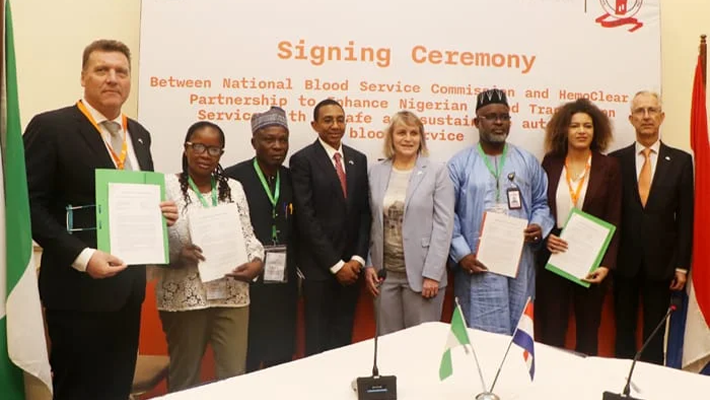By Muhammad Amaan
Nigeria and The Netherlands have signed an agreement on addressing blood shortages leading to unnecessary suffering and death.
The Coordinating Minister of Health and Social Welfare, Professor Muhammad Ali Pate while signing the agreement in Abuja, said the partnership aligned with the National Health Plan to increase blood supply.
Represented by the National Coordinator, Presidential Unlocking Healthcare Value-Chain Initiative, Dr Abdu Mukhtar, the minister added that the agreement would also unlock the health sector value chain and encourage private sector participation.
“The partnership to initiate an autologous blood service resonates with the vision of President Bola Tinubu to establish a coordinated blood ecosystem.
“This partnership aligns with the National Health Plan and the Presidential initiative to unlock the health sector value chain and encourage private sector participation.
“Its primary goal, however, is to increase the blood supply, thereby saving the lives of numerous Nigerians,” Pate said.
Similarly, Professor Saleh Yuguda, Director-General, National Blood Service Commission (NBSC), said the partnership would reduce blood shortages, especially for treating cancer, sickle cell anaemia, among others.
“We expect that this will help boost synergy for blood value chain optimisation and increase blood supply quality and efficiencies thereby reducing pains and saving Nigerian lives.
“Incorporating autologous transfusions will significantly mitigate blood shortages in critical situations, enabling us to reserve donated blood for treating conditions like sickle cell anaemia and cancer,” he said.
Ms Marjolijn Sonnema, Dutch Vice Minister for Public Health, explained the challenges of implementing autologous blood transfusions services in regions with limited resources due to its sophisticated equipment.
Sonnnema said the partnership would overcome such barriers by introducing HemoClear’s pioneering micro-filtration technology.
She said this would facilitate the collection and processing of a patient’s own blood during surgery, transforming it into safe, transfusion-ready blood without the need for additional machinery or power sources.
On his part, Vincent Franssen, CEO of HemoClea, said: “Partnering with the NBSC, a regional leader in blood service expertise, guarantees streamlined implementation support, offers premier clinical training and logistics know-how, and sets the stage for future local production.”
The NBCS/HemoClear alliance is financially supported by the French Fund for Innovation in Development (FID), reinforcing the commitment to global health improvements.




